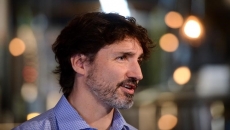Fighter-jet makers are leading with promises of jobs and other economic spinoffs as they make their final pitches for why Canada should buy their planes to replace the military's aging CF-18 fleet.
Friday marks the deadline for U.S. aerospace companies Lockheed Martin and Boeing, as well as Swedish firm Saab, to submit their bids in the current fighter-jet competition, which will see Canada spend up to $19 billion on 88 new planes.
The closing of the competition marks a major milestone in Canada's decade-long effort to buy new fighter jets for the Royal Canadian Air Force, which has been plagued by government mismanagement and political controversy.
While the combat capability of each of the three competing planes — Lockheed Martin's F-35, Boeing's Super Hornet and Saab's Gripen — will be the main focus as the government evaluates each bid, there will also be a lot of focus on the economic benefits of buying each plane.
To that end, Lockheed Martin commissioned a report in February that found up to 4,200 jobs will be created or sustained each year if Canada buys its F-35 stealth fighter, which the company equated to more than 150,000 new jobs over the life of the plane.
The analysis provided to The Canadian Press, which was compiled by Toronto-based OMX, also predicted the Canadian economy will see roughly $15 billion in additional activity between now and 2058 if the F-35 is selected to succeed the CF-18 as Canada's primary fighter jet.
That is in addition to the $2 billion in economic benefits that Canada has already received since 2007 as one of nine partner countries in the development of the F-35, which lets Canadian companies compete for work associated with the stealth fighter.
Canada has contributed US$541 million since 1997 to be a partner in the F-35 program.
"Lockheed Martin has prepared a comprehensive proposal," the company said in a statement on Thursday.
"The F-35 is the most capable, best-value fighter to strengthen defence, enhance ally partnerships and contribute to economic growth in Canada with significant, long-term industrial opportunities."
Lockheed Martin isn't the first to toot its own horn on the potential economic benefits of its fighter.
Boeing last month released its own commissioned report showing its existing operations in Canada created $5.3 billion in economic spinoffs last year and supported 20,000 jobs. Boeing says the numbers will go up if the Super Hornet wins, though it has not revealed its exact estimates.
The emphasis on jobs and money — rather than combat capability — comes as Canada's economy has been battered by the COVID-19 pandemic, forcing the federal government to spend tens of billions in financial support for Canadians.
Defence analyst David Perry of the Canadian Global Affairs Institute said it makes sense for companies to highlight the potential economic benefits of their bids. He said it helps to make the cost more palatable to the public and is also important in determining the winner.
"In any competition like this, you're always looking for any potential partial point that you can get," Perry said.
"Companies, if they're going to invest this significant time and significant amount of money preparing a bid like this, then they don't leave anything to chance. You make sure you try to wring every single last partial point you can get out of your proposal."






